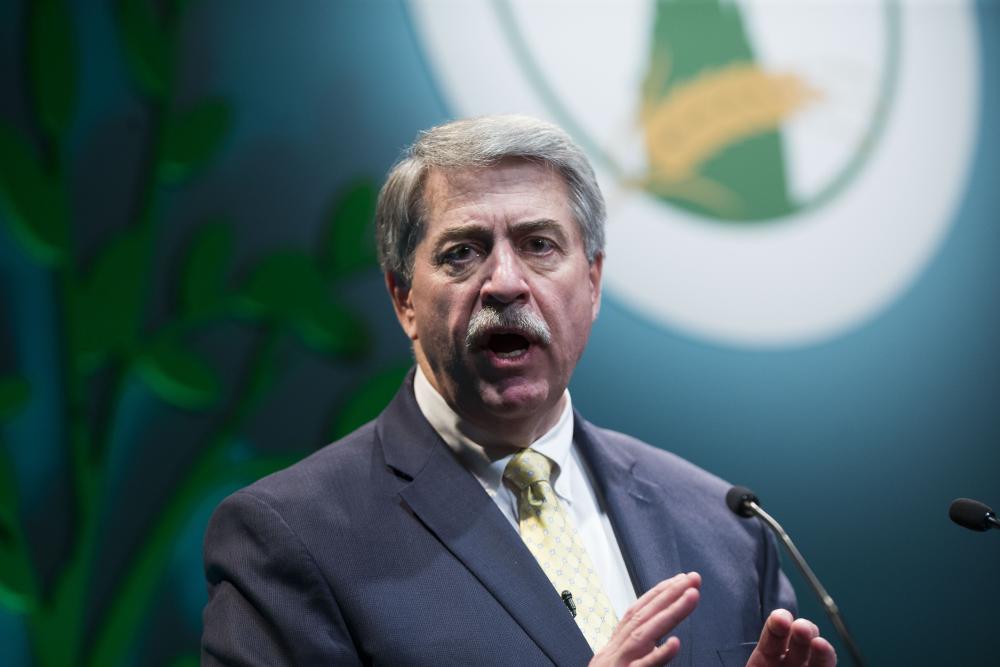US agri-trade chief hits back at suggestions UK will be flooded with inferior imports

America's agricultural trade chief Ted McKinney was stung by questions about US farming standards as he was quizzed in the UK about possible agricultural obstacles to a post-Brexit UK-US trade deal.
British farmers have raised serious concerns that British health and welfare standards could be undermined in the rush to secure trade deals with countries like the United States.
Environment Secretary Michael Gove has insisted that the UK wants to maintain high standards of quality after it leaves the European Union.
However, towards the end of last year US president Donald Trump's commerce secretary Wilbur Ross said during a speech in London that any post-Brexit deal with Washington would hinge on the UK scrapping the kind of rules currently operated by the EU.
At the start of the New Year Ted McKinney, the Under Secretary for Trade and Foreign Agricultural Affairs at the United States Department of Agriculture (USDA) was at the Oxford Farming Conference to speak to British agricultural industry leaders.
During a press conference following his speech, where he was joined by UK Environment Secretary Michael Gove, they were asked about differences in standards between the two countries.
"We will hold our food safety, environment and welfare standards up against the UK any day of the week and twice on Sunday," said Ted McKinney.
"Let's just get that out of the way. We do hope that your consumers have at least the opportunity - we're not going to force feed anyone - at least have the opportunity to invest in an American turkey or chicken or any other piece of protein that might be of their choosing."
Chlorine washed chicken
Chlorine washed chicken has been one example used by British farming leaders in their arguments against an open-door trade deal. Chlorinated chicken is banned in the EU.
Ted McKinney was asked during the Oxford press conference whether British consumers could look forward to chlorinated turkey for Christmas in future. His reaction showed his frustration with the issue of US standards.
"I am sick and tired of hearing about chlorinated chicken. It's not true. I am not going to take any questions from any of you if you raise chlorinated chicken. We haven't used chlorinated chicken for a long time. I ask that you move on," he said.
Journalists persisted with the questioning on the difference in standards between the two countries. There clearly were differences in welfare standards.
"Wouldn't these be a barrier to a trade deal", they asked. Michael Gove suggested that negotiators should put those issues to one side, as they sought areas of agreement.
"I think the most important thing is don't concentrate on those areas where you have difference first; concentrate on those areas where you have a commonality of interests first," said the Environment Secretary.
"Then build confidence between the two parties that that commonality of interest can be built on and that future difficulties can either be resolved or, if necessary, set aside."
British standards
During his speech to the conference Michael Gove stressed once again that the Government would maintain British food and farming standards.
He said: "Food and drink is the UK's biggest manufacturing sector and one of its fastest growing, with an increase of eight per cent in exports to the EU and 10 per cent in exports outside the EU in the first three quarters of last year alone.
"That success has been built on a reputation for quality and provenance, on the knowledge that we have among the highest environmental and animal welfare standards of any nation on earth.
"So people know when they're buying British they're buying food which is guaranteed to be high quality and more sustainable," he said.
"That's why it would be foolish for us to lower animal welfare or environmental standards in any trade deal, and in so doing undercut our own reputation for quality. We will succeed in the global market place because we are competing at the top of the value chain, not trying to win a race to the bottom."
New economic partnership
The Environment Secretary said he knew there were concerns about maintaining trade with the European Union.
He said the Government was confident of building a new economic partnership with the EU that would "guarantee tariff-free access for agri-food goods across each other's borders."
But Paulo de Castro, vice chairman of the European Parliament's Committee on Agriculture and Rural Development and a former Italian Minister for Agriculture, who spoke at the conference via a video link, said he was concerned about certain issues on agriculture.
He said that during negotiations over a possible EU trade deal with the US sanitary and phytosanitary concerns had become an obstacle.
'We will not interfere'
Ted McKinney, who is from a farming family in Indiana, said it was for the UK to decide which course it wanted to take, although he said there was a great opportunity for increased trade between the two countries.
"The UK will never have an opportunity again, at least not in the near future - probably not in a generation - like you have now to get right whatever right means to you. Ideas of regulations, environmental care, animal welfare, opportunities to export.
"We will not interfere in that process. We are happy to share with you how we do things. We are not going to impose our will in any shape or form except to say we would love to do more trade. And I would remind you that trade is a two way street," he said.
"Will the UK be that trading partner that we see or will there be roadblocks?"








